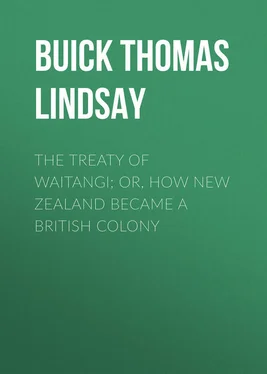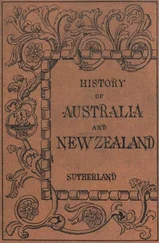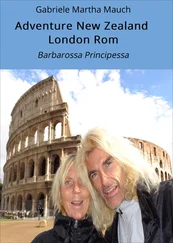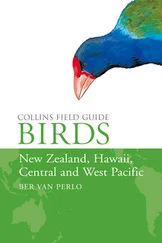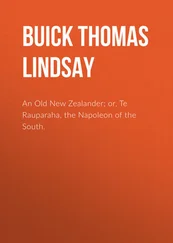Thomas Buick - The Treaty of Waitangi; or, how New Zealand became a British Colony
Здесь есть возможность читать онлайн «Thomas Buick - The Treaty of Waitangi; or, how New Zealand became a British Colony» — ознакомительный отрывок электронной книги совершенно бесплатно, а после прочтения отрывка купить полную версию. В некоторых случаях можно слушать аудио, скачать через торрент в формате fb2 и присутствует краткое содержание. Жанр: foreign_antique, foreign_prose, на английском языке. Описание произведения, (предисловие) а так же отзывы посетителей доступны на портале библиотеки ЛибКат.
- Название:The Treaty of Waitangi; or, how New Zealand became a British Colony
- Автор:
- Жанр:
- Год:неизвестен
- ISBN:нет данных
- Рейтинг книги:5 / 5. Голосов: 1
-
Избранное:Добавить в избранное
- Отзывы:
-
Ваша оценка:
- 100
- 1
- 2
- 3
- 4
- 5
The Treaty of Waitangi; or, how New Zealand became a British Colony: краткое содержание, описание и аннотация
Предлагаем к чтению аннотацию, описание, краткое содержание или предисловие (зависит от того, что написал сам автор книги «The Treaty of Waitangi; or, how New Zealand became a British Colony»). Если вы не нашли необходимую информацию о книге — напишите в комментариях, мы постараемся отыскать её.
The Treaty of Waitangi; or, how New Zealand became a British Colony — читать онлайн ознакомительный отрывок
Ниже представлен текст книги, разбитый по страницам. Система сохранения места последней прочитанной страницы, позволяет с удобством читать онлайн бесплатно книгу «The Treaty of Waitangi; or, how New Zealand became a British Colony», без необходимости каждый раз заново искать на чём Вы остановились. Поставьте закладку, и сможете в любой момент перейти на страницу, на которой закончили чтение.
Интервал:
Закладка:
"On April 29, 1834, General Bourke transmitted to Lord Stanley a proposal from Mr. Busby for establishing a national flag for the tribes of New Zealand, 'in their collective capacity,' and advised that ships built in the Island and registered by the chiefs should have their registers respected in their intercourse with British possessions. Sir R. Bourke reported that he had sent three patterns of flags, one of which had been selected by the chiefs; that the chiefs had accordingly assembled with the commanders of the British and three American ships, to witness the inauguration of the flag, at which the officers of H.M.S. Alligator were also present. The flag had been declared to be 'the national flag' of New Zealand, and being hoisted, was saluted with twenty-one guns by the Alligator , a British ship-of-war.
"On November 21, 1834, a despatch was addressed to Sir Richard Bourke by Lord Aberdeen, approving of all these proceedings in the name of the King, and sending a copy of a letter from the Admiralty, stating that they had instructed their officers to give effect to the New Zealand Registers, and to acknowledge and respect the national flag of New Zealand.
"If these solemn Acts 45 45 These Acts were quoted as evidences of Britain's repudiation of sovereignty in New Zealand, by M. Guizot, the French Foreign Minister, during the debate on the sovereignty question in the Chamber of Deputies on May 29, 1844.
of Parliament, and of the King of Great Britain, are not enough to show that the pretension made on behalf of Her Majesty by this Company is unfounded, it might still further be repelled by a minute narrative of all the relations between New Zealand and the adjacent British colonies. It is presumed, however, that after the preceding statement it would be superfluous to accumulate arguments of that nature and the rather because they could not be intelligibly stated without entering into long and tedious details."
While this discussion was proceeding in England, Captain Hobson was happily on his way to Sydney, with his instructions rendered still more explicit 46 46 After perusing the original draft of his instructions, Captain Hobson referred several matters therein back to the Minister for further explanation, and on August 15, 1839, Lord Normanby replied in a memorandum which amplified his intentions, but in no way changed their spirit.
by further explanation from Lord Normanby, thus eliminating, as far as human forethought could provide, the possibility of misunderstanding as to the extent of his authority, or to the sincerity of the broad humanitarian principles which were to govern his conduct towards the natives.
Reaching Sydney late in December 1839 47 47 On arrival at Sydney Captain Hobson was waited on by a deputation of New Zealand landowners, who requested to know his views regarding their lands. With his answers to their questions the deputation was in general satisfied, as he encouraged them to occupy their lands and proceed with their improvements. Subsequently an address of Welcome was presented to him at Government House, and he appeared highly flattered by the compliment paid him.
he immediately himself to Sir George Gipps, who entered into the spirit of the enterprise with his characteristic enthusiasm for the service of the Empire. During their official negotiations the final arrangements were completed agreeably to the intentions of the Colonial Secretary. Captain Hobson was placed in the possession of the Proclamation under the Great Seal, by which the Government of New South Wales was extended to any territory which might be acquired as the result of Hobson's mission "in those Islands commonly called New Zealand." Simultaneously he was presented with his own Commission as Lieutenant-Governor of any such territory, and with the proclamations he was to issue in New Zealand, as circumstances rendered necessary or advisable. He was also placed in possession of further instructions from Sir George Gipps, who laid special stress upon the financial relations existing between the two colonies. "My responsibility for the due expenditure of the public money of this colony," he said, "is one of which I cannot divest myself, and where responsibility is there also must be control. The extent to which establishments are to be erected in New Zealand, the salaries to be paid to public officers, and the expenditure of public money on public works, must for the present be fixed by myself on estimates and reports or proposals to be forwarded by you." Close enquiry was also made into the legal question which Captain Hobson had raised with Lord Normanby when seeking fuller information regarding his powers of administration. Hobson desired the power to appoint and suspend Magistrates; to pardon offences and remit sentences, and to exercise original control, which the insular position of New Zealand seemed to demand, but which was seldom conferred upon those holding the subordinate office of Lieutenant-Governor. To this request Lord Normanby had replied that all the powers necessary for the proper conduct of his office would be conferred upon him by acts of the Governor and Legislature of New South Wales. Hobson was unconvinced, but deferentially refrained from pitting his lay opinion against that which he naturally assumed was based upon the wider knowledge possessed by the Department. Sir George Gipps had no such reservations, and at once declared his inability to delegate to another powers which had only been delegated to him.
In communicating his final instructions to the Lieutenant-Governor, Gipps wrote: "With respect to certain powers or prerogations of the Crown, with which Governors of colonies are usually entrusted, it is necessary for me to point out to you that though I am myself authorised by Her Majesty to exercise them in her name, and on her behalf, I have no power to delegate the exercise of them to another. From this, which is an inherent maxim in law, it will, I believe follow:
"(1) That you will not have power to pardon offences, or to remit sentences pronounced on offenders in due course of law, though you may stay the execution of the law.
"(2) That you will not be authorised to suspend officers holding appointments direct from Her Majesty, though you may recommend to me the suspension of them. With respect to persons holding appointments from me you will have the power of suspension, and over such as hold appointments from yourself a power of dismissal unless they may have been previously recommended by you for confirmation in the service, in which case your power will extend only to suspension.
"(3) You will not have power of appointing Magistrates, though of course you will recommend to me such persons as you may think fit to be appointed.
"(4) In the event of the enrolment of a militia, the same will hold good respecting the appointment of officers."
A staff of officials for the due conduct of the civil business of the country was also appointed, 48 48 "Captain Hobson is accompanied by several officers, selected for their known incompetency by Sir George Gipps. What assistance he is to expect from these persons I do not know, but they are evidently sent to New Zealand because Sir George Gipps has no use for their services here, and was consequently anxious to get rid of them." Dr. Martin's New Zealand Letters .
even to a small force of policemen, and with an almost prophetic punctiliousness for detail, a Commission was prepared for his successor in the event of Hobson's death, so that there might be no break in the continuity of official control.
With these preliminaries settled, Governor Gipps, on January 14, issued three proclamations: (1) extending the boundaries of New South Wales to New Zealand; (2) proclaiming Captain Hobson Lieutenant-Governor of those Islands, and "calling upon all British subjects to the aiding and assisting of the said William Hobson in the exercise of his said duty"; (3) to put an end to the speculation in New Zealand lands then being openly carried on in Sydney.
Читать дальшеИнтервал:
Закладка:
Похожие книги на «The Treaty of Waitangi; or, how New Zealand became a British Colony»
Представляем Вашему вниманию похожие книги на «The Treaty of Waitangi; or, how New Zealand became a British Colony» списком для выбора. Мы отобрали схожую по названию и смыслу литературу в надежде предоставить читателям больше вариантов отыскать новые, интересные, ещё непрочитанные произведения.
Обсуждение, отзывы о книге «The Treaty of Waitangi; or, how New Zealand became a British Colony» и просто собственные мнения читателей. Оставьте ваши комментарии, напишите, что Вы думаете о произведении, его смысле или главных героях. Укажите что конкретно понравилось, а что нет, и почему Вы так считаете.
